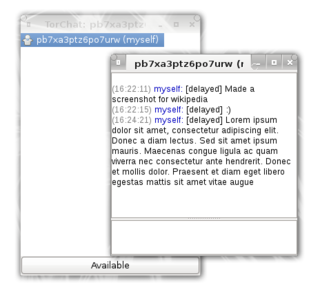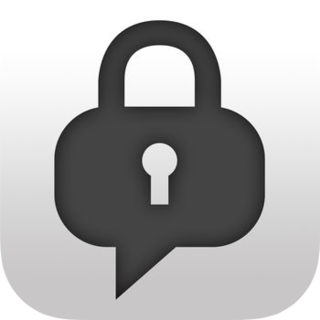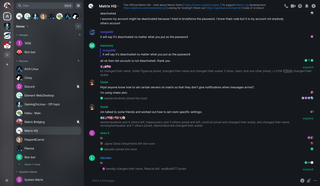
Pidgin is a free and open-source multi-platform instant messaging client, based on a library named libpurple that has support for many instant messaging protocols, allowing the user to simultaneously log in to various services from a single application, with a single interface for both popular and obsolete protocols, thus avoiding the hassle of having to deal with a new software for each device and protocol.

Extensible Messaging and Presence Protocol is an open communication protocol designed for instant messaging (IM), presence information, and contact list maintenance. Based on XML, it enables the near-real-time exchange of structured data between two or more network entities. Designed to be extensible, the protocol offers a multitude of applications beyond traditional IM in the broader realm of message-oriented middleware, including signalling for VoIP, video, file transfer, gaming and other uses.

Psi is a free instant messaging client for the XMPP protocol which uses the Qt toolkit. It runs on Linux, Windows, macOS and OS/2.
The following is a comparison of instant messaging protocols. It contains basic general information about the protocols.
Off-the-Record Messaging (OTR) is a cryptographic protocol that provides encryption for instant messaging conversations. OTR uses a combination of AES symmetric-key algorithm with 128 bits key length, the Diffie–Hellman key exchange with 1536 bits group size, and the SHA-1 hash function. In addition to authentication and encryption, OTR provides forward secrecy and malleable encryption.

Jingle is an extension to XMPP which adds peer-to-peer (P2P) session control (signaling) for multimedia interactions such as in Voice over IP (VoIP) or videoconferencing communications. It was designed by Google and the XMPP Standards Foundation. The multimedia streams are delivered using the Real-time Transport Protocol (RTP). If needed, NAT traversal is assisted using Interactive Connectivity Establishment (ICE).
Tigase is an open source project started by Artur Hefczyc in October 2004 to develop an XMPP server implementation in Java.

Jitsi is a collection of free and open-source multiplatform voice (VoIP), video conferencing and instant messaging applications for the Web platform, Windows, Linux, macOS, iOS and Android. The Jitsi project began with the Jitsi Desktop. With the growth of WebRTC, the project team focus shifted to the Jitsi Videobridge for allowing web-based multi-party video calling. Later the team added Jitsi Meet, a full video conferencing application that includes web, Android, and iOS clients. Jitsi also operates meet.jit.si, a version of Jitsi Meet hosted by Jitsi for free community use. Other projects include: Jigasi, lib-jitsi-meet, Jidesha, and Jitsi.

MCabber is a free software client for the instant messaging protocol XMPP with a text user interface based on ncurses. It runs on a range of platforms, including Linux, BSD, and Mac OS X. As free software it is freely available – including the source code – under the terms of the GNU GPL-2.0-or-later. MCabber is the successor of Alejandro Jimenez Macias's earlier Cabber that has had releases from 2002 to 2004. In 2005 it has been forked off the last version of Cabber (0.5.0).

TorChat was a peer-to-peer anonymous instant messenger that used Tor onion services as its underlying network. It provided cryptographically secure text messaging and file transfers. The characteristics of Tor's onion services ensure that all traffic between the clients is encrypted and that it is very difficult to tell who is communicating with whom and where a given client is physically located.

The Guardian Project is a global collective of software developers, designers, advocates, activists, and trainers who develop open-source mobile security software and operating system enhancements. They also create customized mobile devices to help individuals communicate more freely and protect themselves from intrusion and monitoring. The effort specifically focuses on users who live or work in high-risk situations and who often face constant surveillance and intrusion attempts into their mobile devices and communication streams.

F-Droid is an app store and software repository for Android, serving a similar function to the Google Play store. The main repository, hosted by the project, contains only free and open source apps. Applications can be browsed, downloaded and installed from the F-Droid website or client app without the need to register for an account. "Anti-Features" such as advertising, user tracking, or dependence on non-free software are flagged in app descriptions.

ChatSecure is a messaging application for iOS which allows OTR and OMEMO encryption for the XMPP protocol. ChatSecure is free and open source software available under the GPL-3.0-or-later license.

Tox is a peer-to-peer instant-messaging and video-calling protocol that offers end-to-end encryption. The stated goal of the project is to provide secure yet easily accessible communication for everyone. A reference implementation of the protocol is published as free and open-source software under the terms of the GNU GPL-3.0-or-later.
TextSecure was an encrypted messaging application for Android that was developed from 2010 to 2015. It was a predecessor to Signal and the first application to use the Signal Protocol, which has since been implemented into WhatsApp and other applications. TextSecure used end-to-end encryption to secure the transmission of text messages, group messages, attachments and media messages to other TextSecure users.

Movim is a distributed social network built on top of XMPP, a popular open standards communication protocol. Movim is a free and open source software licensed under the AGPL-3.0-or-later license. It can be accessed using existing XMPP clients and Jabber accounts.

OMEMO is an extension to the Extensible Messaging and Presence Protocol (XMPP) for multi-client end-to-end encryption developed by Andreas Straub. According to Straub, OMEMO uses the Double Ratchet Algorithm "to provide multi-end to multi-end encryption, allowing messages to be synchronized securely across multiple clients, even if some of them are offline". The name "OMEMO" is a recursive acronym for "OMEMO Multi-End Message and Object Encryption". It is an open standard based on the Double Ratchet Algorithm and the Personal Eventing Protocol . OMEMO offers future and forward secrecy and deniability with message synchronization and offline delivery.
The Signal Protocol is a non-federated cryptographic protocol that can be used to provide end-to-end encryption for voice calls and instant messaging conversations. The protocol was developed by Open Whisper Systems in 2013 and was first introduced in the open-source TextSecure app, which later became Signal. Several closed-source applications have implemented the protocol, such as WhatsApp, which is said to encrypt the conversations of "more than a billion people worldwide" or Google who provides end-to-end encryption by default to all RCS-based conversations between users of their Messages app for one-to-one conversations. Facebook Messenger also say they offer the protocol for optional Secret Conversations, as does Skype for its Private Conversations.

Element is a free and open-source software instant messaging client implementing the Matrix protocol.

Conversations is a free software, instant messaging client application software for Android. It is largely based on recognized open standards such as the Extensible Messaging and Presence Protocol (XMPP) and Transport Layer Security (TLS).













